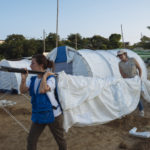Seguro que te has encontrado alguna vez con ellos en Zenia Boulevard. Habrán intentado que les dediques un minuto de tu tiempo porque tienen algo importante que contarte: quiénes son los refugiados y cómo es su día a día. Son los captadores de socios del Comité español de ACNUR. Hacer un nuevo socio equivale a cambiar la historia de muchos refugiados. Te lo contamos.
“Cuando estás en terreno durante una emergencia, puedes ver que cada contribución de nuestros donantes marca una diferencia, incluso si tan sólo nos permite comprar un cubo o una lona de plástico para dar refugio a una familia”, explica Roberto Mignone, Coordinador Principal de Emergencias en ACNUR.
Sobre estos pequeños gestos hablan los captadores de socios del Comité español de ACNUR a los clientes de Zenia Boulevard. Desde hace tres años, cuentan con un espacio en el centro comercial para conseguir que cada vez más personas se unan a la causa de los refugiados y se hagan socios del Comité español de ACNUR.
- Ahmad (46) and his wife Mariam (44) come from the countryside outside Aleppo, Syria. They have five children: Mohamad (15), Nada (girl, 13), Heba (girl, 11), Ghfran (girl, 9) and little Ibrahim (5). They receive UNHCR cash assistance, which helps them pay the rent for their two-room shelter in Amman. “[The cash assistance] helps us. If it didn’t exist, our life would be very difficult.” (Ahmad) In this image: Ibrahim and his sister drawing. Their brother Mohamad warms his hands by the heater his father purchased thanks to UNHCR cash assistance. ; Syrian refugee family living in Amman Jordan. As of Febuary 2016 there are over 630.000 registered refugees in Jordan
- UNHCR Senior Field Associate Sarah Jabin assists a Rohingya refugee from Maungdaw, Myanmar in opening a package of core relief items distributed by UNHCR at the Kutupalong extension site. ; As hundreds of thousands of Rohingya sought safety in Bangladesh between late-August and mid-September 2017, UNHCR began work on an extension site next to the long-established Kutupalong refugee camp in Cox’s Bazar. Whole families, young mothers and unaccompanied minors were among those fleeing for their lives since fighting reignited in Myanmar. They came by boat or walked barefoot for day, leaving most of their possessions behind. Large groups crossed into south-eastern Bangladesh hungry, in poor physical condition and in need of life-saving support. By mid-September, the Bangladeshi Government allocated some 2,000 acres of land, on which family tents and temporary communal shelters were erected to shelter new arrivals. UNHCR site planners estimate that these will be sufficient to house 150,000 of the estimated 415,000 people who have arrived in Bangladesh.
- UNHCR staff along with the Police and local People work together to install tents in Chamanga donated by UNHCR. 14 tents were installed in a terrain next to the «Mons Enrique Bartolucci» primary school. These Tents will hold up to 100 people who lost their houses in the earthquake. ; On Saturday, 16 April 2016, Ecuador was hit by a 7.8-magnitude earthquake -the most powerful to strike the country since 1979. Hundreds of people have been killed and widespread damage has been reported up to 190 miles away from the epicentre.
- Yazidi asylum-seeker carrying UNHCR thermal blankets for his family at Faneromeni, Greece. ; As winter approaches, UNHCR prepares camps for winterization with the distribution of non-food items like thermal blankets. Faneromeni is a facility rented by UNHCR to accommodate Yazidis refugees and asylum-seekers. The blankets are funded by the European Union’s EU Humanitarian Aid and Civil Protection department (ECHO).
- Nuzha, 39, pictured with her one and a half year old son, Mustafa, in the Pioneer Camp for internally displaced persons in Tartous, Syria. Nuzha, whose husband is a truck driver, fled Aleppo with her family three and a half years ago after fighting reached their neighbourhood. She says of her situation, «We suffer here with the weather but otherwise we can survive. We wish to return safely to our home, my children need education, they have already missed 3 years. This is our country we will not leave. They are humiliated outside, at least we live in dignity.» The site is a former summer camp that was opened to displaced persons in 2012. It houses 423 families, (2272 individuals) mostly from Aleppo. There are currently 6.6 million people displaced inside Syria and UNHCR and its partners are working to bring assistance to as many as many as they can. ; A former summer camp in has been turned in a camp for internally displaced persons, in the coastal city of Tartous.
Una donación que protege, alimenta y educa
“Después de huir, empecé a reír y a bromear otra vez”, asegura Mahmoud, desplazado interno en Irak. Ahora descansa junto a su mujer y sus seis hijos en el campo de desplazados de Khazer. Desde 1951, la Agencia de la ONU para los Refugiados trabaja para asistir y proteger a millones de personas que, como Mahmoud, han tenido que huir de sus hogares a causa de la guerra, la persecución o la violación de derechos humanos. Actualmente, hay 65,6 millones de personas en esta situación y el Comité español de ACNUR cuenta con más de 454.000 socios regulares que quieren darles su ayuda, su calor.
Con 1€ al día financian tres sobres de Plumpy Nut, un preparado alimenticio terapéutico para niños que sufren malnutrición severa y que si lo toman tres veces al día durante una semana pueden ganar 1Kg de peso. Con 15€ al mes, hacen posible la entrega de un calefactor a dos familias sirias para soportar las gélidas temperaturas del invierno. Con 18€ al mes escolarizan a 12 niños durante un año. Y con 35€ al mes consiguen que se envíen tres mosquiteras a los refugiados rohingya.
En 2016, gracias a la continua colaboración de sus socios, ACNUR pudo entregar más de 21 millones de materiales de emergencia y desarrollar, entre otros, programas de educación, formación profesional, retorno voluntario (vuelta de los refugiados a su lugar de origen cuando no supone un riesgo para sus vidas), integración en la comunidad local y reasentamiento en un tercer país. La aportación regular de un socio puede cambiar la historia de muchos refugiados y sin estas cuotas mensuales, el trabajo que desarrolla ACNUR no sería posible.
- Lebanon / Syrian Refugees / Omar, 7, pictured in a «Second Shift» class at Vera Frangieh school, in Zgharta, north Lebanon. Amat has a medical condition which means his growth is stunted. In Syria he was receiving treatment but has been unable to continue his treatment in Lebanon. He says, «I like school a lot because they teach me French, in Syria we don’t get taught French. I just want the war to stop so I can go back to Syria. What I miss most about Syria is my bicycle.» With so many young Syrian refugees now living in Lebanon classrooms throughout the country have become overcrowded. In order to absorb the extra Syrian refugee children who have no access to education UNHCR has facilitated a second shift of classes in participating schools. In Vera Frangieh school the second shift runs from 2.30 until 6.30 and consists of 5 classes teaching, Arabic, French, maths, science and social studies, with students ranging between the ages of 6 to 14. When completed the program hopes to include 5200 Syrian children. / UNHCR / A. McConnell / January 2014
- A UNHCR worker warms the hands of a woman in a wheelchair as local people come to watch aid workers offload desperately needed supplies from a convoy of inter-agency trucks in Mouadamiyeh in rural Damascus. ; After three years under siege, bombarded and starved, the rebel-held Damascus suburb of Mouadamiyeh finally surrendered to Syrian Government forces in early September 2016. A peace deal meant civilians and rebels were evacuated to other parts of the country while those who remained were able to access vital food supplies and humanitarian aid. On 22 and 24 September, a UNHCR relief convoy of trucks and staff arrived as military blockades preventing access were lifted. UNHCR staff were assisted by Syrian Arab Red Crescent volunteers and teams from other UN agencies. Despite routine blocking of UN aid, since the beginning of 2016 the UN and its partners have successfully provided assistance to 1.2 million civilians in besieged locations.
- “My smile helped me overcome many difficulties in Mosul,” says father-of-six, Mahmoud Ahmad, 35, as he and his family enjoy the freedom that greeted them on arriving at a camp for displaced Iraqis. After two years living under militants who forced the men to grow beards and women to wear niqabs, Mahmoud’s family escaped to Khazer camp, near the village of Hasansham, 30 kilometres from their home in Mosul. ; In preparation for a military operation to retake Mosul in October 2016, UNHCR made plans to deal with the mass-displacement that might occur. Eleven new camps have been built by UN agencies and the Iraqi Ministry of Migration and Displacement. They are designed to accommodate 120,000 people. Emergency plans are also in place to provide tents and supplies to those who cannot access the camps. Around 3.3 million Iraqis, ten per cent of the population, have fled their homes since March 2014.
¿Por qué es importante para ACNUR tener socios regulares?
- Cuando ocurre una emergencia, estos fondos permiten a ACNUR enviar ayuda en las primeras horas, sin depender de las donaciones de los días posteriores.
- Para las crisis olvidadas, que atraen poco o nada a los medios de comunicación, permiten a ACNUR mantener un adecuado nivel de asistencia y protección.
- En las operaciones en terreno, posibilita implementar los programas de la manera más completa posible, ya que permite a ACNUR priorizar y destinar fondos donde más se necesitan, contribuyendo por tanto a una mayor eficiencia de la organización.
Si quieres conocer más a fondo el trabajo de ACNUR por y para los refugiados, pásate por el Espacio Solidario de Zenia Boulevard nos visita con frecuencia el Comité español de ACNUR. Estarán encantados de contarte en qué puede convertirse tu ayuda.









